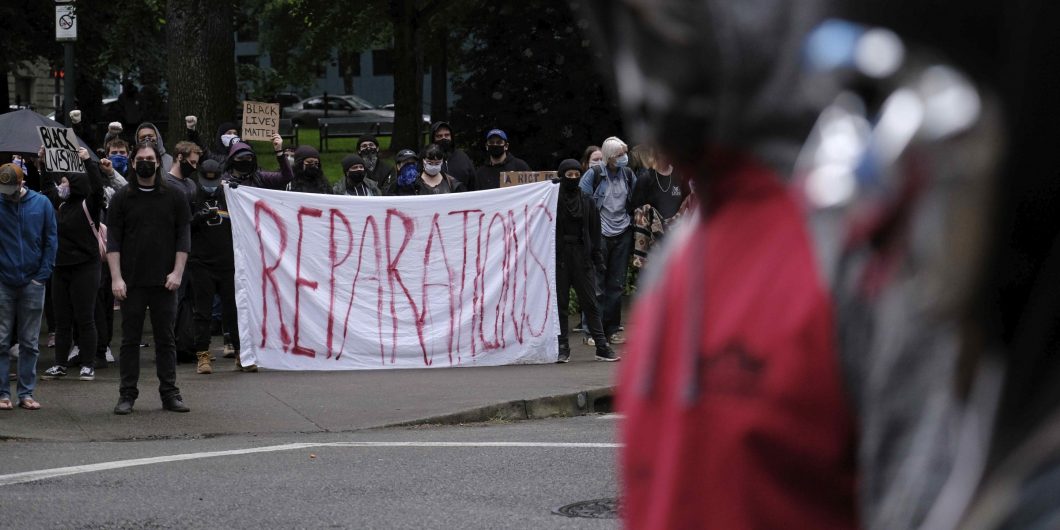Nozick's Radical Logic of Reparations
The provision of reparations for slavery has been a longstanding demand of Black Lives Matter and other leftist organizations. In 2016, the United Nations Working Group of Experts on People of African Descent demanded that the United States finally confront its legacy of “racial terrorism” by providing reparations in the form of apologies, better education, and debt cancellations to descendants of slaves.
Even before mass protests rocked American cities in the wake of George Floyd’s tragic death on May 25, interest in reparations had migrated into the political mainstream. During the Democratic primaries in 2019, several candidates agreed to study or discuss the issue. Senator Cory Booker went so far as to support reparations outright, arguing that it was far from obvious that America was “truly free from the historically rooted and hideous legacy of slavery.” The mere consideration of this policy by top Democrats is a sea change in the history of their party. Not so long ago, Bernie Sanders, Hillary Clinton, and former President Barack Obama preferred to focus on providing better education, health care, and other services for the poorest African-Americans rather than embracing reparations.
On the Republican side, Senate Majority Leader Mitch McConnell voiced the traditional critique of reparations before a House hearing on the subject last year by declaring that they were neither necessary nor practical. Reparations “for something that happened 150 years ago, for whom none of us currently living are responsible” were not a good idea. Moreover, “We tried to deal with our original sin of slavery by fighting a Civil War, by passing landmark civil rights legislation, [and we] elected an African American president,” McConnell said. He added: “I don’t think we should be trying to figure out how to compensate for it. First of all, it would be hard to figure out whom to compensate.” Nevertheless, some corporations that are under pressure to provide reparations have already taken some tentative steps.
The Lockean Proviso
Given the current interest in reparations, it is important to understand the implications of this proposed policy. How far back in history should a nation go in addressing past injustices?
The libertarian philosopher Robert Nozick (1938-2002) attempted to answer this question in his award-winning book Anarchy, State, and Utopia (1974). One of the most controversial ideas contained in this work is Nozick’s defense of the “Lockean proviso,” which requires the “rectification” of outcomes that result from the unjust appropriation of property. Reparations redressing the effects of slavery, however, may just be the tip of the iceberg should we accept this robust conception of the Lockean proviso. Going back into the past in search of wrongs could lead to the discovery of innumerable injustices that conceivably demand contemporary rectification by their perpetrators’ descendants. It could also serve as the rationale for radically altering (and even abolishing) the global capitalist system altogether. For this reason, the proviso has been far more popular on the Left than the Right.
Nozick usually comes across as a rather traditional libertarian, arguing that “principles of justice” regarding the acquisition and transfer of property exclude theft, fraud, and enslavement. A just appropriation of property must be the result of voluntary and informed consent that both parties to the exchange of property freely exercise. However, he also emphasizes the importance of understanding the “original” or “historical” manner in which the ownership of property came about. If “past injustices” (including theft, fraud, and enslavement) enabled this ownership, then “rectification” of these crimes must take place. Nozick consistently argues that parties that have been made “worse off” by actions like these deserve compensation.
The historic injustices that wealthy capitalist nations of the global North have inflicted on the poorer nations of the South, in the form of exploitation of labor and theft of resources, may justify application of the Lockean proviso on a grand scale.
Nozick radically departs from his philosophical inspiration, John Locke, on the subject of rectification. Locke had a very straightforward understanding of what this meant. In his Second Treatise on Government, Locke wrote that the act of “reparation…belongs only to the injured party.” Moreover, this “damnified Person has this Power of appropriating to himself, the Goods or Service of the Offender, by Right of Self-Preservation.” In short, if one person steals the property of another, then the “injured party” has every right to take it back. Yet Locke stipulated that this act of “reparation” applies only to the “injured party” who clearly participates in an exchange of goods or services. He took no interest in acquisitions and transfers of property that affect third parties. Instead, Locke insisted that someone who “hath mixed his Labour” with the land justifiably acquires it as his property. In the process, he does not make worse off those who failed to enter an exchange that would motivate them to mix their own labor with the land. As long as land is in abundance, no third party should complain that some individuals have worked harder than others to possess their property by the sweat of their brow. For this reason, Locke indirectly rationalized the expropriation of the lands of the “Americans” (natives) at the hands of the Europeans in his age.
Locke’s idea of reparation, then, applies only to those who are either a first or second party to an exchange of property, not a third party. This implication would be too restrictive, according to Nozick, who rejects Locke’s idea that mixing one’s labor with the land somehow gives one greater entitlement to it. Nozick also finds it necessary to supplement Locke’s defense of property rights by pointing to the problem of injustices that go far back in time. Specifically, he contends that those who are made “worse off” as a result of an unjust acquisition of property are entitled to rectification, although he is vague on details. Nozick writes:
If past injustice has shaped present holdings in various ways, some identifiable and some not, what now, if anything, ought to be done to rectify these injustices? What obligations do the performers of injustice have toward those whose position is worse than it would have been had the injustice not been done? . . . How, if at all, do things change if the beneficiaries and those made worse off are not the direct parties in the act of injustice, but, for example, their descendants? How far back must one go in wiping clean the historical slate of injustices? . . . I do not know of a thorough or theoretically sophisticated treatment of such issues.
This version of the Lockean proviso is far more radical than what Locke intended because it applies to all injured parties directly or indirectly affected by an acquisition or transfer of property in history.
The Libertarian Argument for Abolishing Capitalism?
The fact that Nozick leaves open the possibility that a “more extensive state” might be temporarily needed to rectify past injustices probably explains why prominent libertarians (including Ludwig von Mises) rejected his version of the Lockean proviso. However, the proviso has been popular on the Left, particularly with regard to attempts to justify reparations for slavery. The philosopher Bernard R. Boxill has argued that the failure of the US government to compensate the emancipated slaves of the postbellum era clearly justifies the payment of financial reparations to their descendants for this grave injustice, which adversely affects them to this day. Nozick’s reluctance to put a clear timeline on how far back rectification should go opens the door for some to urge ambitious attempts to redress countless past injustices.
Although Nozick never intended the proviso to serve as a justification to eradicate capitalism, he may have opened this door as well. The analytical Marxian philosopher Kai Nielsen (1926-) has argued that “even Nozickian notions of justice in rectification would require redistribution between North and South.” That is to say, the historic injustices that the wealthy capitalist nations of the North have inflicted on the poorer nations of the South (or developing world), in the form of exploitation of labor as well as theft of resources, justifies the application of the Lockean proviso on a grand scale. Consistent with the proviso, the capitalist North should not only transfer a considerable portion of its wealth to the South for the purpose of righting past wrongs. The North should also abolish capitalism, which made the poorest people of the South worse off than they were before capitalism.
One of Nielsen’s claims illustrates how opponents of capitalism can use the Lockean proviso to their advantage. Nielsen correctly points out that the transformation of a pre-capitalist economy into a capitalist one can inflict harm on millions of people who must make the painful transition from an agrarian way of life to an urbanized and industrial one. The capitalist North has repeatedly pressured the South to undergo this transformation. Nielsen writes:
A previously self-sufficient agriculture in Third World countries radically declined and ceased to be self-sufficient. Much of the rural population, in a state of impoverishment, as a huge reserve industrial army, was in effect driven into the cities and in tandem with that, as rural production declined, rural life became ever more impoverished.
One need not be a Marxist to know that this process characterized the rise of capitalism in the North as well, particularly in the 18th and 19th centuries. It is also a process that is both common and painful to developing economies. The fact that people who enjoyed “self-sufficient agriculture” did not consent to this process qualifies them as third parties affected by the decisions of their government. It is also a process that can take a very long time to complete, even though it may eventually raise the standard of living for workers inside the cities. Finally, it is likely that the suffering incurred by the poorest people involved in this change will affect future generations as well.
Following Nielsen’s logic, the application of Nozickian rectification would require, at the very least, massive compensation for the descendants of those who suffered the loss of their cherished rural way of life. It would also require, at the very most, the abolition or restructuring of a system that makes rural folks worse off than they were before the onset of industrialization.
Although no one in the political mainstream is demanding the end of the market economy at the moment, there is little reason to think that the debate over reparations will not lead to an eventual debate over capitalism’s historic effects along with a host of other wrongs that we now believe we can right.



